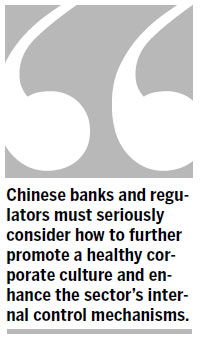

Remuneration structures linked to short-term performance have created incentives for dishonesty and must be changed
There has been a lot of focus recently on a long and growing list of scandals involving some of the biggest global banks. Barclays has been in the spotlight for manipulating the London inter-bank offered rate and has been fined $460 million by regulators in the United States and United Kingdom.
But Barclays is not alone, the list of other banks involved includes some of the best-known global banks, from Citigroup, JPMorgan Chase, and Deutsche Bank to HSBC, RBS and UBS.
In addition, JPMorgan Chase announced a fresh assessment of losses in the trading positions of its London-based unit, which have now been revised upward to $5.8 billion. Meanwhile, HSBC faces the threat of being fined up to $1 billion by the US authorities for allegations of laundering money and financing terrorists, and Standard Chartered has been accused by the US financial watchdog of violating anti-money laundering rules.
It is not surprising that the banking sector, already under attack in the midst of the global financial crisis, has been hit by a new wave of criticism. But most worryingly, trust and confidence in the financial system have reached a record low.
Although there are many reasons why the banking sector collectively has perpetrated so many misdeeds and broken ethical norms, greed is one of the root causes. Therefore, to fix the banking sector requires reshaping its corporate culture.
The values of an organization are shaped by its corporate culture. Of course, any business aimed at maximizing shareholders' values must strive to make a profit, but the profit-making activities must be legal and morally acceptable. Experience shows that misbehavior in the banking sector often stems from the belief that only bonuses can reward people. Remuneration structures, often linked to short-term performance, have created incentives for dishonesty.
But as Greg Smith, who resigned as a Goldman Sachs executive director and head of the company's US equity derivatives business, wrote in an article, "Why I am leaving Goldman Sachs": "people who care only about making money will not sustain this firm - or the trust of its clients - for very much longer".
Leadership plays an important role in shaping the culture of a bank. Clearly, the "tone at the top" is a key factor influencing how a bank operates. Moreover, qualified leaders motivate subordinates to work for the good of a bank, not just for themselves. In particular, executives of a bank should have a special responsibility to create an environment where people cannot do bad things. As Bob Diamond, Barclays' former chief executive, once declared, "the evidence of culture is how people behave when no one is watching".
Financial regulatory reforms will help banks change their culture. Imposing higher standards of capital adequacy and liquidity management can lower leverage ratios and increase loss-absorbing capabilities, thus reducing the appetite for taking risks and limiting profits in the banking system.
The scandals of the past months may have been a watershed in policymakers' attitudes toward regulating banking services in many countries. From the Volcker Rule in the US, which prohibits proprietary trading business in banks, to the Vickers Recommendations in the UK, which separate banks' retail business from their investment business, restrictive measures could force banks to be more transparent and change the incentives driving their behavior. It is important that banks stick to their core mission of supporting the real economy.
Regulators in Western countries should learn from their mistakes. The Financial Service Authority in the United Kingdom has reportedly tracked the price-rigging back to 2005. In April 2008, a Barclay's employee told an analyst at the Federal Reserve Bank of New York that the UK bank was deliberately manipulating LIBOR, which was then briefed to the Bank of England and the British Bankers' Association. But the regulators did not respond quickly and thus missed the opportunity to reform the system.
The effects of these scandals will stretch far beyond developed countries. Chinese banks and regulators must seriously consider how to further promote a healthy corporate culture and enhance the sector's internal control mechanisms.
Usually, financial crises occur when what was thought to be low risk turns out to be very high risk. For this reason, the banking sector requires special regulation, because its failures have very big economic, political and social fallouts. In this respect, the nation's top bankers must be accountable and of high integrity, no matter how intensified the competition becomes.
It is understandable that the recent scandals have enraged the public. Nevertheless, it is useless to direct perpetual "blame and shame" at the banks. Instead, the focus should be on how to inspire and encourage banks to fulfill their responsibilities and redefine their culture.
The banking business involves risks and its corporate culture cannot be managed by outside regulation alone. It must be cultivated internally step by step.
The author is chairman of the Board of Directors of Bank of China.
(China Daily 08/13/2012 page8)